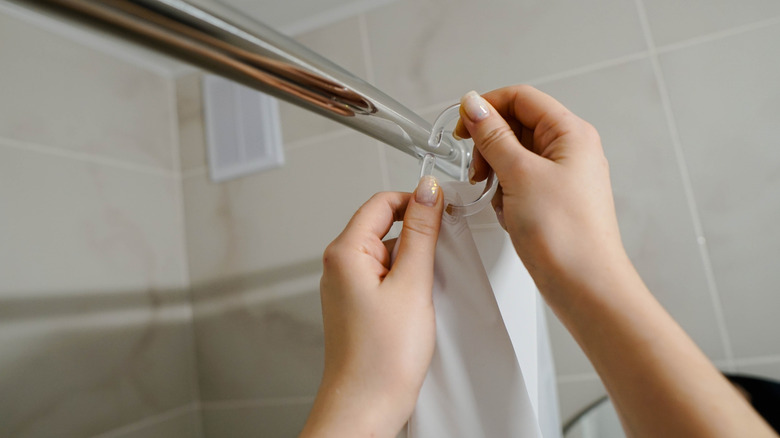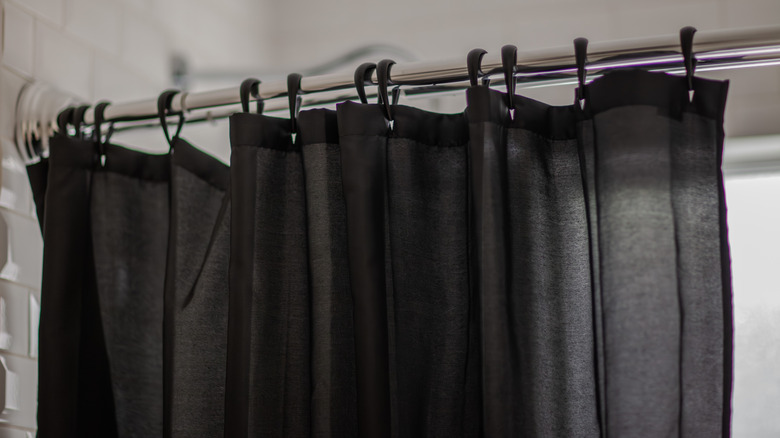Give Your Bathroom A Rustic Touch With A Plastic-Free Waterproof Shower Curtain
We may receive a commission on purchases made from links.
Many of us are familiar with the routine swapping of plastic shower liners to ensure maximum freshness in our bathrooms. After all, shower liners have the potential of accumulating mold and mildew since they are in a high-humidity, damp environment of the home. Medical professionals even recommend cleaning or replacing shower liners every six months or so. However, costs and routine maintenance can quickly become a hassle. Plastic liners can also make your shower curtain look cheap. If you're wondering if there could be a better alternative, you're in luck. Waterproof plastic-free shower curtains, like a wax-treated cotton curtain, are a great solution.
Many homeowners are moving away from common plastic shower liners in favor of more traditional options like cotton instead. With concerns raised over phthalates, volatile organic compounds (VOCs), and other air pollutants caused by the chemical process used to create plastic shower liners, many are nixing this product from their bathroom altogether in favor of cleaner, safer materials. Although cotton liners raise concerns about mold and mildew, there are ways to waterproof the fabric. As one of the shower curtain fabrics that adds a luxurious look to your bathroom, cotton is hard to pass up.
A cotton shower curtain could be a game-changer in your bathroom
Simply replacing your existing shower curtain and plastic liner with a 100% cotton fabric isn't recommended since untreated cotton absorbs and holds water. You'll need to treat your cotton fabric with a waterproofing material to prevent mold growth. One thing you need to know about mildew-resistant shower curtains is that many are treated with a wax coating. While traditional methods utilize a wax bar and hours of application, some products can be added directly to your washing machine, like Nikwax Cotton Proof, which is a wash-in waterproofing solution.
To start, you'll need to purchase a cotton shower curtain. Nikwax recommends washing the material with their Tech Wash first, as some regular detergents can inhibit water repellency. However, some folks have opted to wash their cotton shower curtain in a normal cycle with their typical detergent. Then, remove any detergent from the dispenser and add the recommended amount of Nikwax Cotton Proof solution. Follow the package instructions for washing and drying your material to ensure the water repellency is obtained. Once done, you can hang your shower curtain and enjoy a luxe, plastic-free, waterproof solution.
Caring for and maintaining your cotton shower curtain
To ensure your cotton fabric is water-repellent, you must apply some sort of wax coating. Whichever brand you decide to use, it's important to avoid perfluorocarbons (PFCs). These are long-lasting chemicals that could have negative health impacts on many individuals. Granger's Performance Wash is PFC-free, and the packaging is made of 100% recycled products. Many other similar products are also available that adhere to these ethical and environmental standards.
You will want to reproof your cotton shower curtain regularly to maintain its water repellency. Whether you use a wash, wax, or spray, the effect can fade over time. Nikwax recommends users reapply the treatment once a year or after four to six washes, particularly to outdoor gear. However, this recommendation could change, depending on the fabric. Some users also report that potential puddles in or around the washing machine are possible since the fabric will lose absorbency once the treatment meets the material fibers. Excess water may still soak the curtain despite waterproofing. In most showers this isn't an issue, but occasional reproofing may still be needed.


